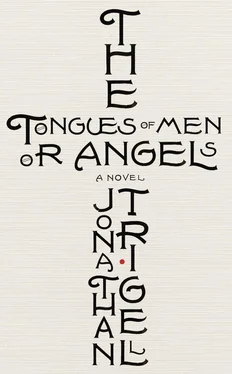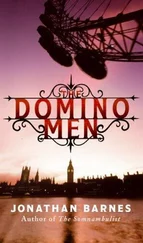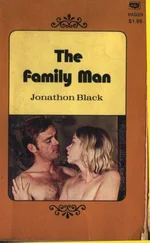‘And they caused such dissension and turmoil — because more than half the devotees at Antioch were non-Jews by then — that it was decided that Barnabas and I would go to Jerusalem to debate it with those apostles who were supposedly such great ones — those who measured themselves by themselves and compared themselves with themselves — those reputed to be the Pillars of the Church: James and Cephas and Jochanan.
‘So, fourteen years after I had last met with them, I went again to Jerusalem.’
Nineteen Years after the Crucifixion
Inside the Jerusalem Temple complex, the initial tiled precinct — twice as large as the Forum of Rome — is open to all people. Here, dilated-eyed animals for sacrifice are sold and money is changed and trinket-sellers peddle. But an elegant low balustrade separates this area from the holier courtyards of the Mount and from the Temple proper. And around this easily crossed but symbolic guardrail, there are numerous near-identical notices, each one stone-carved in a different tongue, and in every language the signs state: No Gentile is to enter beyond the balustrade into the forecourt around the Sanctuary. Whoever is caught will have himself to blame for his subsequent death . That is how it has always been in Judaism: Gentiles are welcome to admire from a distance but they are not allowed in through the Beautiful Gate, clad with golden vines, where the Levites sing, unless they first convert.
Which is why Jochanan can’t really see how they got to this present problem with The Way. It’s not even as if Yeshua left any doubt over his views. He was always saying that The Way was strictly for the lost sheep of Israel. And when the Messiah sent out his Sanhedrin council to spread the word, he explicitly told them — though it hardly needed saying — Do not go among the Gentiles or enter any town of the Samaritans . When a Canaanite woman asked him to heal her daughter that time, Yeshua more or less called her a dog — about the strongest insult there is among the Jews — and told her that dogs couldn’t eat the children’s food. Yeshua was no lover of Gentiles. So why must there now be a debate about Gentiles joining?

When Jochanan and his brother Jacob joined The Way, they stumbled into it. They emerged from forty days hidden in the caper scrub — sharing caves with the sand cats and tuft-eared caracals — onto a bend of the Jordan river, to discover a multitude gathered there. An orderly line of a people who ordinarily know no queues. All waiting on the silt banks to be baptized, apparently unafraid of crocodiles, drifting timber with eyes as old and cold as flint. But, then, there were too many fearful things in that land for anyone to be afraid of them all. There were countless dangers in the wilderness nights, and Jochanan and Jacob were two.
Though Jochanan was still weakened from his wound at that time — he was led by his brother, riding on a stolen camel. A beast still clear in the realm of memory: draped in a colourful collage of blankets, the wooden pommel of a baggage-saddle barely visible from beneath them. Its eyes watery and weeping, lashed like a harem girl’s. Petulant lower lip, and knees dry and cracked as parched earth. How it used to scratch its neck with a split-toed front foot, in a way impossible for a mule or a donkey. They named the camel Herod Agrippa because it was gangling and stupid, yet arrogant and wilful, like some entitled young royal.
But it wasn’t the theft of the camel that led to the brothers’ flight: Herod was merely the means of escape. Jochanan couldn’t have made it a mile on foot at the time. He barely survived as it was.
The act itself was a quarrel with a tax-farmer, a publicanus . Jochanan and Jacob had been two-thirds of the way across a thin footbridge and in plain sight when the tax-farmer set off. Yet still he expected them to turn back, to make way for him and the two legionaries who accompanied him. He said that the camel carrying their chattel couldn’t turn around. And, in that at least, he was probably correct. With the wisdom of reflection, perhaps the brothers should have retreated and sucked up their pride. But they didn’t. They were both cursed with fierce tempers, though that wasn’t why they were called the Sons of Thunder.
There was yelling and swearing in at least three languages, maybe more. But the brothers didn’t turn back and they couldn’t make way, and it eventually became apparent that, on a narrow and strangulated bridge, fishermen’s knives were of more use in a fight than long Roman spears, which could be caught in hand and stepped inside. And Jochanan and Jacob, bred and raised in hauling nets, had arms and shoulders more powerful than any soldier’s. So the tax-farmer had a smile slashed across his haughty, traitorous mouth and he was tumbled into the creek, with a screech like a goat-kid torn from its mother. And the first legionary had an iron blade, sharpened that morning with Galilee stone, thrust up under his leather breastplate into the clutch of amorphous organs that men need just as much as fish do. But the second Roman let go of his spear and drew his sword and put a wound across Jochanan’s throat, before Jacob could force him to the ground. The cut was already made, before Jacob could put the Roman to the floor of the bridge and beat him to death with his own shield. Repeatedly slamming it into the man’s head until first his helm came off and then the crown of his head came off, like the lid of an amphora, revealing grey furls like crab gills. But even though Jacob killed a Roman with his own shield — caved in his face and carved off the top of his skull — plastering with blood the shield’s blasphemous Thunder Bars, that wasn’t why the brothers were called the Sons of Thunder.
Jochanan was amateurishly patched, by a fisher-brother who knew a lot about knots and nets but little about bandages. And they fled then, Jochanan camel-carried like a sack of spice, into the hills. Jacob led them on foot, leaving a deliberate trail at first, outside inhabitation, so that their crime — if killing traitors and invaders is a crime — would not be blamed on others. Only when they had left civilization behind did he start to choose paths across rock and through streambeds. Only then did he start to leave false clues and dust their true tracks.
Jochanan was cut across the throat — he could hear his own breath whistling through the wound — and carried far into the wilderness. And yet somehow he survived. It was a miracle. But then, as Jochanan realized when it began to seem possible that he would not die, what isn’t? The sun and the clouds and the ants and the words. They are all miracles. Every life and every day is a miracle. There is nothing so special about not dying, except that it allows you to witness every other miracle as if for the first time. It rapts you with awe at the overbearing wonder of everything and teaches you what it means to love, to truly love. To love your life and your family and your land and your brother Jacob and your God.
And weeks later, on a path they thought to lead them home again, among the silver of tamarisk and willow, the brothers stumbled upon The Way.

And now The Way has led Jochanan here, to this meeting of leaders. Jacob is not in attendance: The Way led Jacob to his death, seven years back. Beheaded, angry until the end, a true Son of Thunder. Though the trial court, if you could call it that, called him Son of Zebedee.
Zebedee their father is dead, too, of course. He was a big man, in a small way, Zebedee. I’m world famous, in Galilee ; that was his joke. It’s important to be someone’s son. And Jochanan was always proud to be Zebedee’s. Then suddenly Zebedee was gone and so was Jacob; and Jochanan was a singular Son of Thunder, but one of Three Pillars. The Three Pillars of The Way, who now apparently must rule on the admission of Gentiles.
Читать дальше













